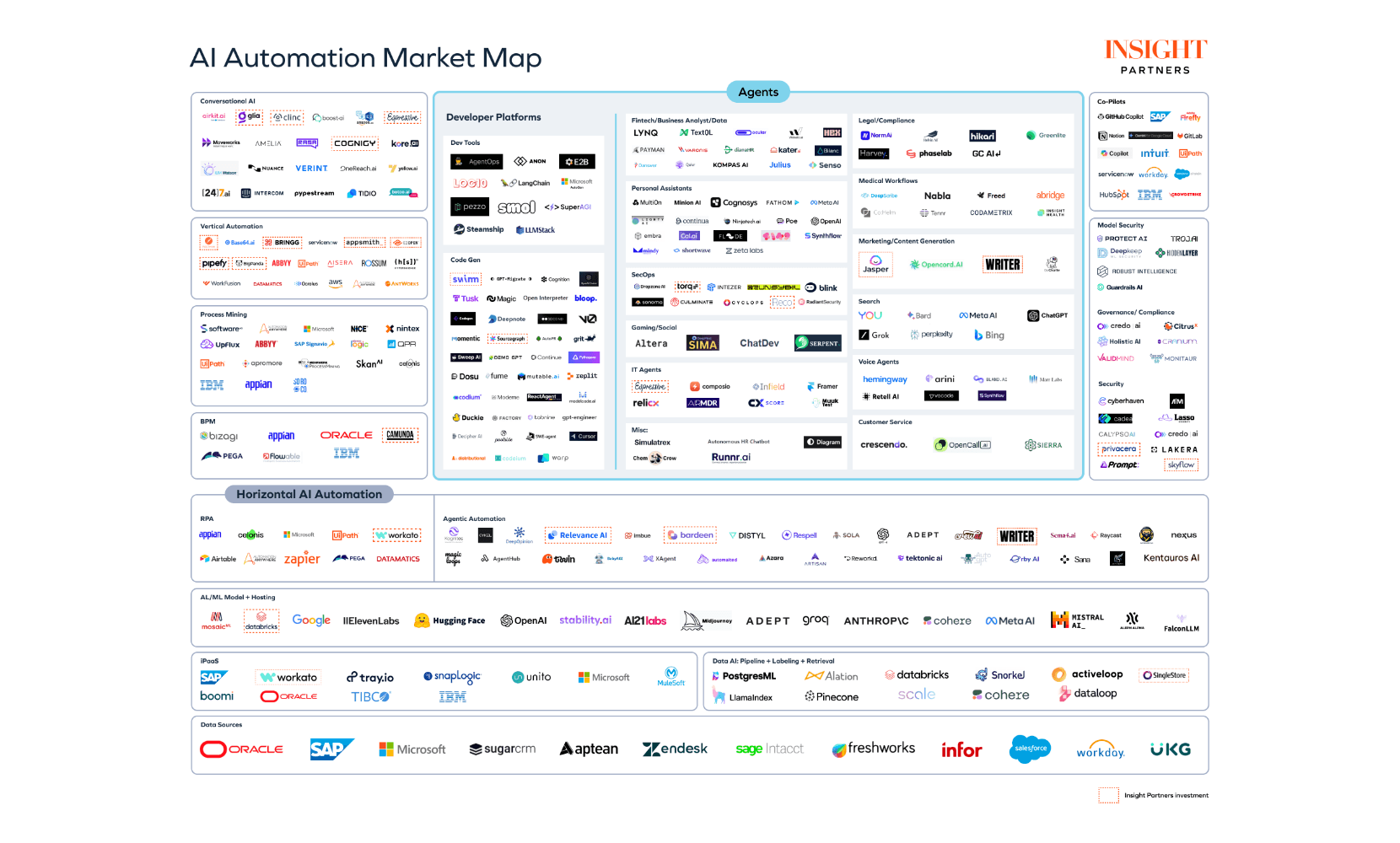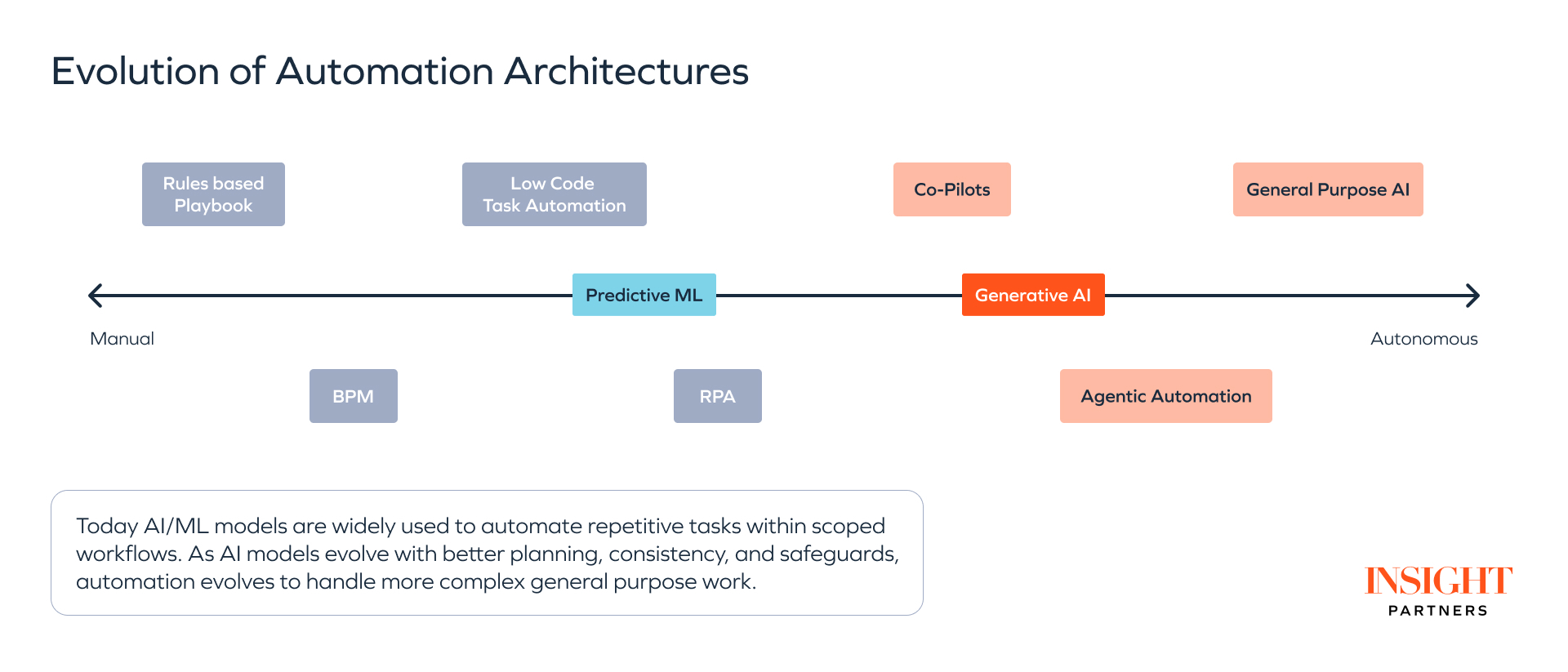https://www.insightpartners.com/ideas/ai-agents-disrupting-automation/

The mainstreaming of AI tools has ignited hope for dramatic productivity improvements for knowledge workers and consumers alike. Transformer-based Large Language Models (LLMs) have demonstrated AI capabilities that are transforming workflows with new automation approaches. In the article below, we trace the automation journey in the age of AI and dig into some of the current and evolving platforms. This article content is based on numerous conversations with researchers, builders, incumbents, enterprise users, and internal conversations within Insight.
Let’s start with a few predictions on how we see the automation space evolving:
- Everyone will have an AI assistant, from consumers to knowledge workers. This will redefine traditional boundaries between vertical applications, automation platforms, and IT services, creating transformational market opportunities for entrepreneurs. AI assistants will take different forms, from copilots for incumbent platforms to applications with embedded AI and various forms of AI Agents.
- Human-in-the-loop is the operative framework for deploying generative AI solutions. Most use cases today are in experimentation or early production with a focus on advisory and assistant-oriented workflows. LLMs can’t yet predictably plan or reason and areas like memory and context are still in research. In Automation platforms where deterministic execution is critical, LLMs are being used for specific tasks at “design time,” not at “run time.”
- Automation is a hard problem and is often underestimated. Incumbents are adding AI to their playbooks and deep experience to improve platform efficiency and UX. State-of-the-art LLM providers are adding Agent modeling, collaboration, and access to tools to enable users to rapidly build AI Agents (GPTs). ScaleUps looking to break through need to deliver differentiated customer value with reimagined workflows grounded in unique datasets and a simple UX.
- Deployment of Automation with AI will take a “Crawl, Walk, Run” approach, starting with simple tasks to more complex workflows. The key is to keep experimenting with Agents, learn where AI capabilities truly add value, and ensure the right “scaffolding” in terms of data, tools, and run-time is part of the Automation architecture. As AI model capability grows, the scale can gradually slide towards leveraging more AI functionality.
- Code generation has emerged as a foundational element in developing genAI-based applications and Agentic Automation platforms. Code has two key attributes that make it an ideal LLM function: It is a form of text, and it has well-defined performance measures. Initial versions of coding copilots are widely deployed today, and we are now seeing full-fledged AI-enabled developer platforms. Code-gen LLMs will play a critical role in Agent architectures.
Evolution of Automation platforms
Automation is a constant human endeavor. Every knowledge worker is familiar with the humble “macro” — a shortcut for a repetitive set of commands to add an extra boost of productivity.
Early automation efforts focused on workflows like Quote-to-Cash, Payroll with engineers writing bespoke code, stitching together these workflows governed by static rules and definitions. These brittle early approaches drove development of the first generation of automation platforms, such as:
- Robotic Process Automation (RPA) platforms deliver maximum value in automating repetitive manual tasks. They combine a library of predefined workflows and a low-code/no-code platform to help users build their own playbooks. RPA platforms have progressively incorporated AI/ML models to expand their capabilities.
- iPaaS platforms like Workato started by creating a middleware layer to integrate data, application sources, and APIs to connect different resources. This data layer is a critical input for Automation engines and creating a clean interface is the first step in the Automation journey.
- Low-Code Task Automation platforms offer a predefined set of integrations with a simple UI to automate repetitive tasks for knowledge workers and SMBs.
- Various Vertical Automation approaches focused on specific workflows in domains such as supply chain, IT operations, and developer ecosystem as well as chatbots for customer-facing use cases like help desks and customer service teams.
While these platforms significantly reduced repetitive work, complexity remained in the bootstrapping needed with predefined workflows or consultative rollouts to realize the value of automation. Implementations have also been brittle to operating environment changes in the enterprise.
GenAI has the potential to accelerate this automation journey as incumbents incorporate compelling capabilities into their platforms today, builders experiment with new architectures, and researchers push towards the ultimate goal of an autonomous Artificial General Intelligence (AGI).



